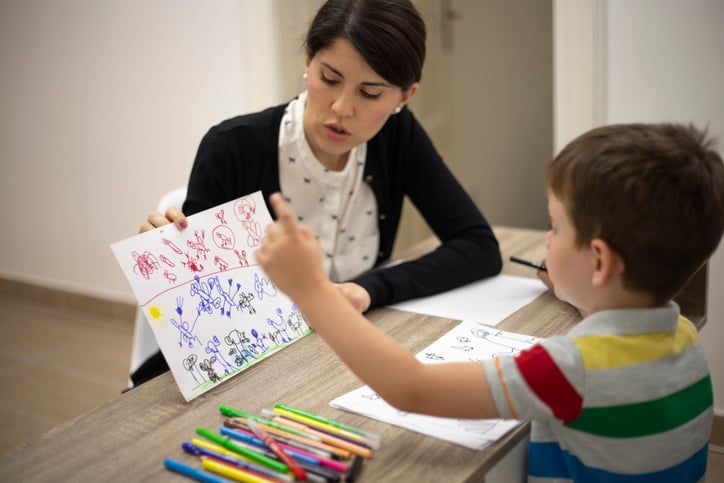Cognitive Milestones in 4-Year-Olds
Watching early childhood development unfold is a captivating experience, each year brimming with new surprises and milestones. As children reach the age of four, their world becomes increasingly intricate, particularly in terms of cognitive development. This pivotal phase in a child's growth is marked by significant cognitive milestones that pave the way for more structured learning and effective communication.
The Evolution of Cognitive Skills
At four, children undergo remarkable transformations in cognitive abilities, enabling them to interact with their environment in more complex ways. This age is characterized by significant advancements in:
- Problem-Solving Skills: The ability to think through solutions to simple problems emerges, allowing children to solve puzzles and figure out how to use new toys, reflecting their growing analytical skills.
- Understanding of Time: Four-year-olds begin to grasp time concepts and the sequence of events, distinguishing between "yesterday," "today," and "tomorrow," which is crucial for their temporal awareness.
- Memory Improvement: Enhanced memory enables the recall of recent events and learned information, such as recounting a day's activities at preschool or remembering parts of a story, indicating a maturing short-term and working memory.
- Increased Attention Span: The ability to focus on tasks for extended periods without immediate supervision develops, enabling engagement in activities like drawing or building with blocks for longer times, showcasing improved concentration.
- Advanced Language Use: The use of more complex sentences and an understanding of simple grammar rules become evident, marking a significant leap in language development and communication skills.
- Conceptual Understanding: Grasping abstract concepts such as numbers, colors, and sizes becomes possible, laying the foundation for mathematical and logical reasoning.
These cognitive milestones are critical for preparing children for the more structured learning environments they will encounter in school and enhancing their ability to communicate thoughts and emotions effectively.

What to Watch Out For
As with all developmental milestones, it's essential to be aware of signs that may indicate concerns in cognitive development:
- Delays in Language Skills: Struggles with forming sentences, limited vocabulary, or difficulties in following simple instructions might suggest developmental concerns that warrant further evaluation.
- Challenges in Problem-Solving: If a child shows little interest in solving puzzles or becomes easily frustrated with problem-solving tasks that peers manage, it could be a sign of cognitive development delays.
- Difficulty with Conceptual Understanding: Struggles with understanding basic concepts like numbers, shapes, or sizes could indicate a need for additional support in cognitive development.
Next Steps for Concerns
If you observe any of these signs or have other concerns about your child's cognitive development, a conversation with your child's healthcare provider can provide guidance. They may recommend developmental screening or evaluations by specialists such as pediatric psychologists or educational therapists to understand your child's needs better and offer appropriate support.

Fostering Cognitive Growth
Encouraging exploration, posing open-ended questions, and providing varied learning experiences can significantly support children's cognitive development during this crucial stage. Recognizing and nurturing these milestones create an environment that promotes curiosity, understanding, and a lifelong love for learning.
Empowering the Journey
Understanding cognitive milestones is crucial for parents, caregivers, and educators, enabling them to effectively support children's development. Providing opportunities that challenge and engage children's cognitive skills is essential, but it's also important to recognize and celebrate each child's unique pace of learning and discovery.
The cognitive development of 4-year-olds is a complex blend of growth, learning, and exploration, weaving a rich tapestry of young minds. With patience, encouragement, and a nurturing environment, we can support and celebrate the incredible cognitive leaps they make, setting the stage for a lifetime of learning and curiosity.
This article is taken from 5 part series on Developmental Milestones in 4-Year Olds. The other articles in this series include:
- Four Critical Areas of Development for 4-Year-Olds
- Physical Development in 4-Year-Olds
- Cognitive Milestones in 4-Year-Olds (this article)
- Language & Communication in 4-Year-Olds: What to Expect
- Social & Emotional Development of 4-Year-Olds

Angela Nelson, J.D., Ed.M.
Angela Nelson is the creator of the widely-recognized Language Builder Picture Card Series, and the creator and lead author for the Language Builder ARIS curriculum. Angela received her BA and JD from UCLA where she studied and practiced behavior psychology under Dr. Ivar Lovaas, and her Ed.M. at the Harvard Graduate School of Education, with a focus on technology innovation and education. As Founder and CEO of Stages Learning Materials, Angela has created autism, special needs and early childhood curriculum products since 1997. In addition to her duties at Stages, Angela writes for multiple industry publications and is Chair of the Education Market Association.




